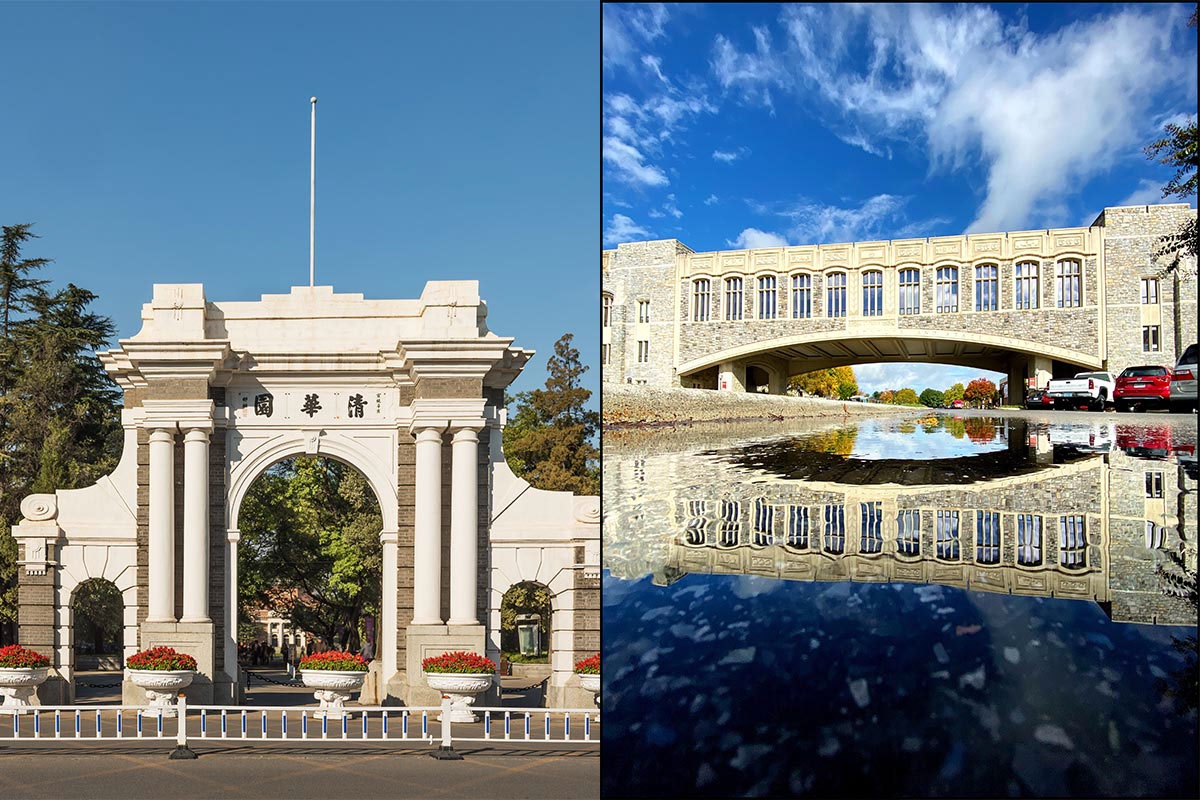Collaborations for education: A globe-spanning university partnership

When Virginia Tech Professor Fred C. Lee gave an open talk at Tsinghua University in 1987, he was introducing power electronics to a packed auditorium of students and faculty. Unbeknownst to him, Lee — the founding director of the Center for Power Electronics Systems (CPES) — was also kicking off a relationship between two technology leaders that would span continents and decades.
Today, that relationship includes an agreement to establish a joint research center and formal visitation programs. A group from ECE and CPES had planned to visit Tsinghua in February and representatives from Tsinghua planned to participate in the 2020 CPES-Power and Energy Center (PEC) Annual Conference. Although both visits have been postponed due to the international COVID-19 upheaval, the relationship remains strong.
Tsinghua University was founded in 1911 on part of the Qing Dynasty’s royal gardens in Beijing, known as the Tsinghua Gardens, and then reorganized as a university specializing in polytechnic education and research after the founding of the People’s Republic of China. It began expanding its offerings across the humanities and sciences in the 1970s and is now one of China’s premiere universities, as well as one of the top academic institutions in the world with renowned strength in Electrical and Electronic Engineering.
Tsinghua and Virginia Tech both have strong research and education programs, particularly in the areas of power electronics and power systems. According to the Memorandum of Collaboration signed in 2018 by ECE and Tsinghua’s Department of Electrical Engineering, the two institutions will first establish a joint research center for the study of electronic power systems and then work towards founding an International Science and Technology Cooperation Laboratory through programs offered by the Chinese government.
After his first visit, Lee visited Tsinghua regularly, giving lectures and recruiting students to apply for graduate education at Virginia Tech. Tsinghua developed a fund specifically to encourage further exchanges with Virginia Tech to share expertise in power electronics, and Lee was named a Guest Professor by Tsinghua in 1997 and an Honorary Chair Professor in 2017.
During this time, thanks to a steady stream of talented students from Tsinghua, ECE faculty mentored Ph.D. students and offered guest lectures and summer courses at Tsinghua. A Memorandum of Cooperation was signed in 2014, and, recently, Tsinghua has begun sending groups of undergraduates to Blacksburg for summer internships.
According to the latest 2018 agreement, these exchanges will continue in a more structured and reciprocal manner. ECE faculty will have opportunities to teach summer courses and work with advanced students at Tsinghua, and Tsinghua’s faculty will be able to visit Virginia Tech for up to a year with support from their institution. Grants will be available to graduate and undergraduate students for short-term exchanges, and there are already plans for groups of 5-10 Tsinghua students to visit Virginia Tech for up to two weeks over the summer.
ECE faculty will also work with their counterparts at Tsinghua to pursue joint research publications and conference publications.
The experience of ECE’s Dong Dong hints at the possibilities intensified cooperation between the two institutions could open up. He completed his undergraduate studies at Tsinghua, then attended Virginia Tech for his M.S. and Ph.D. degrees in ECE. “I was very fortunate to receive an education at both universities,” he explains, “Tsinghua has very good undergraduate programs. I really learned a lot of fundamental knowledge and skillsets that prepared me for my graduate work here. Virginia Tech is very strong in power electronics and power systems education, so I was also very fortunate to study here.”
Dong is now helping to facilitate and plan discussions between the departments. Through the collaboration, he observes, “You kind of reach all the professors who taught me in the very beginning. It’s an interesting feeling.” He also sees the potential for ECE to attract talented students from Tsinghua’s undergraduate programs. “The benefit to me,” he explains, “is that I can know more students over there. So, I can try to lure students to come do research here.”
As Dong points out, ECE’s association with Tsinghua’s Department of Electrical Engineering will also help promote both universities internationally and foster research innovation, especially in the areas of power electronics and power systems.


